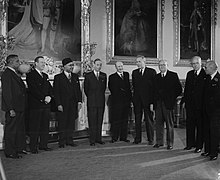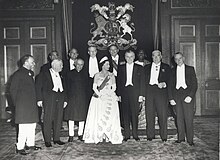Head of the Commonwealth
Subsequently, during the reign of Queen Elizabeth II, other nations, including Pakistan, Sri Lanka, Ghana, and Singapore, also became republics, but, as members of the Commonwealth, recognised her as the organisation's head.
[2] Per agreement reached at the CHOGM in 2018, Charles III succeeded Elizabeth II as head of the Commonwealth upon her death on 8 September 2022.
[3] In the late 19th and early 20th century, the British Empire began to be referred to as the Commonwealth of Nations, with several colonies gaining substantial autonomy as they achieved Dominion status.
This proposal was rejected, and the treaty that ended the war saw the Irish Free State remain part of the Commonwealth as a Dominion.
The Irish Free State, under de Valera's leadership, changed its constitutional law to create the office of an elected President of Ireland and limit the monarch to only a ceremonial role in foreign relations as a "symbol of cooperation" with other nations of the Commonwealth.
At that point, George VI was still king of the United Kingdom, Canada, Australia, New Zealand, South Africa, India, Pakistan, and Ceylon.
Through the 1980s, Queen Elizabeth II sided with the majority of Commonwealth heads of government, and against her British prime minister, Margaret Thatcher, on the matter of imposing sanctions on apartheid South Africa,[17] a point echoed by former Commonwealth Secretary-General Shridath Ramphal, who said, "so steadfast was the Queen to the antiapartheid cause ... that, once again, she stood firm against the position of Thatcher".
This act was taken as the Queen's symbolic expression of her anti-apartheid stance;[22] the image offended the white South African government.
[17] However, Elizabeth's visit, made despite recent bombings in the capital, was mainly intended to keep Ghana in the Commonwealth amid fears the country was getting too close to the Soviet Union.
This is a tradition begun by Queen Elizabeth II at the suggestion of Canadian Prime Minister Pierre Trudeau in 1973,[30] when the CHOGM was first held in Canada.
"[43] It was argued by Philip Murphy and Daisy Cooper that the role should simply lapse upon Queen Elizabeth's death, as Prince Charles was, at the time, in an "impossible position": promoting himself would be "anachronistic and presumptuous", whereas showing no interest would be "characterised as neglectful".
[44] A report that Prince Charles would accompany the Queen to the 2015 Commonwealth Heads of Government Meeting in Malta claimed Elizabeth was "determined to see the headship descend to her son", while accepting that "it is not a done deal".


